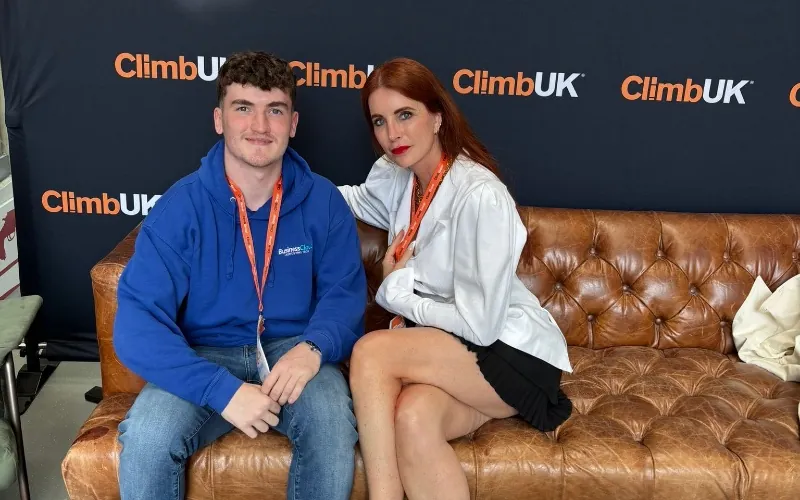Nell Daly is not your typical venture capitalist.
A practising psychotherapist, writer, mother of three and media commentator, she has built a career on understanding what drives people and what holds them back.
Now, with her investment firm Revenge Capital, she is channelling that insight into economic empowerment for underrepresented founders on both sides of the Atlantic.
Embodying the desire to travel and tell her story, she joins me ‘slightly jetlagged’ in the media room at Climb 25 in Leeds, after a long-haul flight from the States.
“I was treating a lot of depression and anxiety in my office,” she says, recalling over a decade spent in clinical practice. “I realised what I really needed to do was help more people gain economic empowerment in their own lives in order to improve their mental health.”
That conviction — rooted in therapy and lived experience — led Daly to fund her own path into venture capital. With the aptly named Revenge, she’s rewriting the rules for who gets backed and why.
From therapist to founder & funder
Before founding Revenge Capital, Daly had little experience in investment but there was no sign of a lack of desire.
“I taught myself how to fundraise,” she explains.
“I taught myself the language around venture capital — equity, middle market debt, finance in general. It was a completely new field for me.”
Within five years, she has done just that and is now a founding partner of a $70m venture capital fund.
Revenge Capital is headquartered between London and New York, reflecting Daly’s cross-Atlantic perspective and her desire to back founders in both markets.
The fund is deliberately sector-agnostic, and crucially, evergreen — meaning it doesn’t pressure companies to scale fast and exit quickly.
“I didn’t want to continue that cycle of abuse, especially for women,” Daly says. “If we seed a female founder, I don’t want someone breathing down my neck to breathe down their neck and bully them to scale really quickly.
“I know some deals will be very quick to exit. Other deals are going to take time. I wanted to be an impact investor and invest in people and ideas I believed in.
“It doesn’t necessarily mean that their ideas are solving some sort of world issue, that’s not my mandate.
“And by the way, it can be two white boys with a drink brand – we’re fully inclusive.
“This is because A) I have a male counterpart, B) I have sons and C) in my mind, you always want to create the world in which you want to see in the future.”
This long-term approach reflects her belief that founders, particularly those from underrepresented backgrounds, need space, support and time. It’s a model built on trust, not urgency.
‘It’s not just about being a good freaking human’
While Daly is clear that her fund champions diverse teams and founders, she’s equally clear that inclusion must be universal.
Her view of diversity spans race, gender, sexuality, neurodiversity and socioeconomic background — and she believes investors who ignore that are missing out.
She says: “Diverse teams — not only is it about being a good freaking human — but it’s better for business. It’s just smart,”
“It’s mind-boggling to me that people haven’t internalised the memo.”
Much of Daly’s mission is rooted in personal history. Raised in a patriarchal household, she saw early how gender biases shaped opportunities.
“My dad, if he had money, would have bet on my brothers more than he would have bet on me,” she recalls.
“That drove me to success, because I was competitive and I wanted to be seen.”
She describes a generation of women who were subtly and overtly discouraged from pursuing business or tech.
“They were given the message their whole life: if you want to start a business, it’s going to be really hard,” she says. “You’re not going to be able to scale it.”
By backing these women now, she hopes to trigger a ripple effect and enable them to reinvest in their own communities, before becoming investors themselves.
She continues: “I can’t mandate what they do but you hope they’ll write checks to other female entrepreneurs or political candidates they believe in. That’s how wealth and power shifts.”
Leadership through lived experience
Daly is candid about the risks that come with speaking up, especially as a public figure in the US.
“It’s more dangerous than ever to be a woman in my country and talk openly about some of the things we talk about,” she says.
“I finally hit that tipping point where I don’t have to go back to that corporate job. And I feel an enormous responsibility to be the voice for people who can’t normally say anything about the inequities they face.”
Despite media appearances on CNN, Fox, and CNBC, Daly’s message has always been rooted in empathy.
She believes that true leadership comes from deep listening — even to those you disagree with.

Nell Daly at Climb 25
She says: “I have very conservative friends in my life. If you study mediation, or any time people solve really big problems, it’s neighbours having nuanced conversations, over and over again.
“Just because maybe you have different views to me doesn’t mean we can’t communicate and get on.”
The therapist in the boardroom
While Daly doesn’t psychoanalyse founders ‘on the fly’, her clinical background gives her a unique edge in venture capital.
“Founders work on a business for years, and stress levels are high – it takes a toll on their mental health and families,” she says. “I do a lot of counselling in those moments — probably in a much different way than someone who doesn’t have that training.”
She sees her role not just as an investor, but as a mentor, advisor and support system, as she says: “What I’m helping people do is achieve their own self-actualisation – to achieve their dreams.”
The future of inclusive venture
As Revenge Capital grows — with six full-time staff expected by the end of the year and a rotating fellowship programme — Daly’s mission remains clear: make capital more inclusive, more humane and more effective.
“You always want to create the world you want to see in the future,” she says. “That’s the job.”


